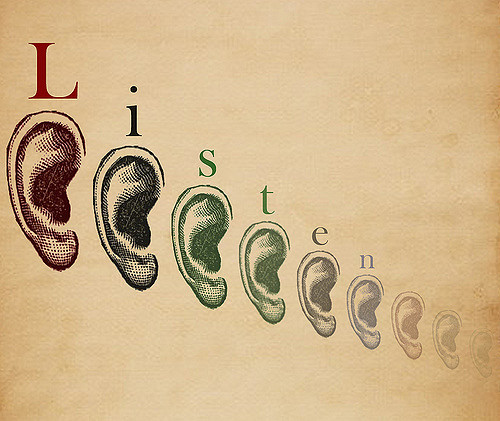
Have you ever wanted to give someone feedback because you care about them and want the best for them, but you weren’t sure how to do so without them getting upset at you?
Whether it’s a significant other, family member, close friend, coworker, or employee, it can be tricky to provide feedback without it being interpreted as an attack. You just want to help, but you find that you’re pushing the ones you love away.
As a business owner employing over twenty people, and also as a consultant to hundreds of business owners and executives, I constantly have to find constructive ways to give feedback. On the other hand, I also always need to be open to criticism because feedback is a two-way street, giving and taking. Why do you think the most successful businesses in the world care so much about customer satisfaction? In the same fashion, you’ll notice that the people who are the most liked and respected also are the most open-minded.
There’s a saying that stand up comedians from NYC are better than ones from the West Coast because when you suck, people in NYC just tell you that you suck, so you can get better. West Coast audiences are too worried about hurting your feelings to tell you your set was bad, so you never know what to improve.
Ultimately, if you have people in your life that care enough about to you to give you constructive criticism, then you’re a very lucky person. (Sometimes you might get unsolicited feedback as well. Take it for what it’s worth, because that can also be beneficial.) Constructive criticism is how you grow, by learning what is and isn’t working about your approach. If you don’t know what’s wrong, you can’t fix it.
Below I’ve highlighted the key points of giving and receiving constructive criticism.
Giving Constructive Criticism
1. Establish trust

Trust is one of the most important things when it comes to giving (and receiving) feedback. If the person you’re giving feedback to doesn’t trust that you have their best interest in mind, then the feedback isn’t going to be taken well. It will either trigger a defensive reaction or it will simply be ignored.
So how do you establish trust? There isn’t one simple way to do this — it’s a process that takes time. Sometimes you can establish trust by opening yourself up to the other person and being vulnerable. On teams or with co-workers, trust can be built up through exercises such as “Personal Histories,” one of the recommended exercises in the popular entrepreneurial book The Five Dysfunctions of a Team. Personal Histories is an easy exercise that allows individuals to share more about their own personal lives and as a result brings the team closer together because they stop viewing each other as “co-workers” and start seeing each other as fellow human beings with imperfections.
If you are in a situation where you need to give feedback to someone who you don’t have the best relationship with, then you can first start by sharing a vulnerable or embarrassing story about yourself that ties into your feedback. This helps break tension and allows you to ease into a conversation.
2. Timing is everything

Knowing when to give feedback is vital for effectiveness. Feedback should be given as soon as it is practical. Imagine if your dog just pooped all over your house, and you scolded it a week later — humans aren’t dogs, but the point is the same: if someone makes a mistake, you should make an effort to tell them as soon as you can.
Sometimes it simply doesn’t make sense to give feedback in the moment, and if something bothered you a lot, then you might even want to sleep on it because your feedback could come off as overly emotional rather than rooted in rationality. Rapid feedbacking has its benefits though; keeping something that bothers you inside causes you to resent someone over time. Ultimately, you want to strike a balance between giving feedback as quickly as you can, and making sure you’ve had enough time to stop and think about it.
3. Ask if they’re “open to it”
 So the person you want to give feedback to trusts you, the thing you want to give feedback is recent but you’ve had time to decide what you want to say, and you’re ready to dive in. The next thing you should consider is whether they want your criticism or not. Some people simply don’t want feedback for whatever reason — maybe you’re not an expert in their field, or maybe they already know what they did wrong and don’t need you to repeat it.
So the person you want to give feedback to trusts you, the thing you want to give feedback is recent but you’ve had time to decide what you want to say, and you’re ready to dive in. The next thing you should consider is whether they want your criticism or not. Some people simply don’t want feedback for whatever reason — maybe you’re not an expert in their field, or maybe they already know what they did wrong and don’t need you to repeat it.
If you have thought about it and you still have feedback to give someone, make sure it’s not unsolicited. Stop and ask the person you’re giving constructive criticism to if they are “open to feedback.” This usually works well because most people want to consider themselves “open-minded,” so the response is oftentimes positive.
If they say they are open to it, then you can proceed, but if they say no, then you’re probably wasting your time — and theirs. Respect their no and move on.
4. Start with praise

If the person you want to give constructive criticism to gives you the green light, you can always start by pointing out the good. Starting with praising someone for things that they do well or things that you really like about them is a great way to get everyone to relax and let their guard down a little bit. If you’re always criticizing, that person will start to feel like you’re personally attacking them or have it out for them. Instead, a better approach is to first share something kind that you really admire about the person before you offer the criticism. This way, you show that you can see the positive aspects of what they do, and not only the negative.
5. State how something makes you feel

Next time you’re giving feedback, try explaining how something makes you feel instead of just saying what the other person did. This shifts your feedback from seeming like it is a personal attack to helping them understand the impact of their actions. If the person cares about you, then they should be glad that you let them know that something they did bothered you.
For example, if someone did something that hurt your feelings, the conversation can go two ways:
“Why do you always ignore me?” [This seems more like a personal attack, is much more accusatory, and focuses on how they are bad as a person, not on the actions they can change.]
Or:
“Hey, when you ignored what I had to say the other day, it made me feel unappreciated.” [This shows how you felt because of an action that may or may not have even been intentional, and shifts the focus from their personal failing to the result their action had on you.]
6. Give clear recommendations that are actionable

This is probably the most important thing — feedback alone can be valuable, but most of the time you really shouldn’t be giving feedback unless you’ve thought through a few actionable solutions for how the person you’re giving constructive criticism to can actually improve.
It’s easy to point out someone’s faults, but it is much harder to help find actionable solutions that solve those faults. In fact, I don’t believe that criticism is constructive unless you’ve thought about concrete things the other person can do to improve. That’s work for you to do if you really want to make a difference. A lot of times we’re self aware enough to know in the back of our head that we have problems — the real problem is that alone, we don’t always have the solutions to fix them.
Receiving Constructive Criticism
1. Identify why someone is giving feedback

When someone gives you feedback, first think about why that person is offering to share criticism with you. Giving constructive criticism isn’t an enjoyable job for most people — in fact, many people avoid it because they don’t like conflict. It’s easy to assume that someone is personally attacking you when they give you feedback. That’s a perfectly natural first response. The problem is that oftentimes, it isn’t meant to be a personal attack.
You should translate criticism for yourself and determine whether or not the person giving you feedback is trying to genuinely help you as someone who cares about you. If what they have to say has reason to it, don’t instantly deny it, but instead learn from it.
Most of the time, only people who care deeply about you feel comfortable enough to give criticism. Oftentimes, people who don’t know you as well won’t want to give criticism due to the fact that they simply don’t care enough about you for it to be worth their while, or they just don’t feel comfortable, period.
Larry Moss, one of Hollywood’s top acting coaches, says it best in his book The Intent to Live:
“You must continue to let the rose become more sensitive; you must also increase the thickness of the hide. Translate criticism for yourself; see if it’s apt. If it is, don’t deny it, learn from it. If it’s not, move on.”
2. Ask questions, but don’t make it difficult for others to give feedback

When receiving feedback, it’s okay to ask questions and clarify. In fact, you definitely should clarify whenever you are unclear about something. However, don’t default into arguing all the time. That makes it a pain for someone to give you feedback — eventually, people may decide it’s not worth it to share their feelings with you and may stop giving you feedback all together.
In short, when someone offers you the gift of feedback, listen, clarify, and learn, and if you don’t agree, smile, say thank you, and move on.
3. Show appreciation

As mentioned earlier, giving feedback isn’t something that is easy to do for a lot of people, but receiving feedback is one of the most important elements to being self aware and growing as a human being. You should always encourage people to be open with you and share their thoughts. Appreciate the fact that by giving you feedback, they are literally helping you become a better person, and make sure to thank those people for their time and efforts.
4. Let down your guard and listen

Shut off your defense mechanisms and ego for a moment, and just listen. Stop and take in what someone is trying to say before your natural defense mechanisms start responding in full effect and you start giving the other person unsolicited feedback in order to even up the scoreboard.
Sure, it’s easy to criticize someone back to show them that they also have flaws, but that’s beside the point. Don’t make excuses about why they’re wrong, or try to shift the conversation to their flaws. Just be patient and present, and really hear what they have to say. Hopefully they’ve followed the steps above and are someone you trust, who has thought carefully about what they want to say, and has checked to make sure you’re ready to hear it. Do them the courtesy of really paying attention to what they’re offering you instead of reflexively throwing up your shields.
—
I hope these tips and tricks help you give (and receive) constructive criticism to loved ones so they can become better people because of it. Remember, no one is forcing you to agree with someone else’s feedback, but by listening to others, you really have nothing to lose.
On the other side of the coin, giving feedback is a game of picking your battles — don’t be annoying and give feedback all the time on stuff that doesn’t matter, otherwise they’re not going to listen when it does matter. Give feedback thoughtfully when it’s most important and only when it’s necessary.


